What Are Skateboard Trucks Made Of? A Complete Breakdown
Skateboard trucks are an essential part of any skateboard setup. They connect the wheels to the deck and provide the necessary mechanisms for steering and stability. So, the question arises What Are Skateboard Trucks Made Of? The answer to this question can vary depending on the brand and type of truck, but most are made from a combination of metal alloys, urethane, and sometimes, plastic components.
Key Takeaways
- Skateboard trucks are primarily made of aluminum alloys.
- The quality of materials can significantly impact the skateboard’s performance.
- Bushings are usually made of urethane.
- Steel is commonly used for axles and kingpins.
- Different types of trucks are suited for different skateboarding styles.
What Are Skateboard Trucks Made Of?
Skateboard trucks are primarily made of metal alloys, usually a combination of aluminum and steel. The baseplate and hanger are typically made of aluminum for their lightweight and durable properties, while the axles and kingpins are often made of steel for added strength.
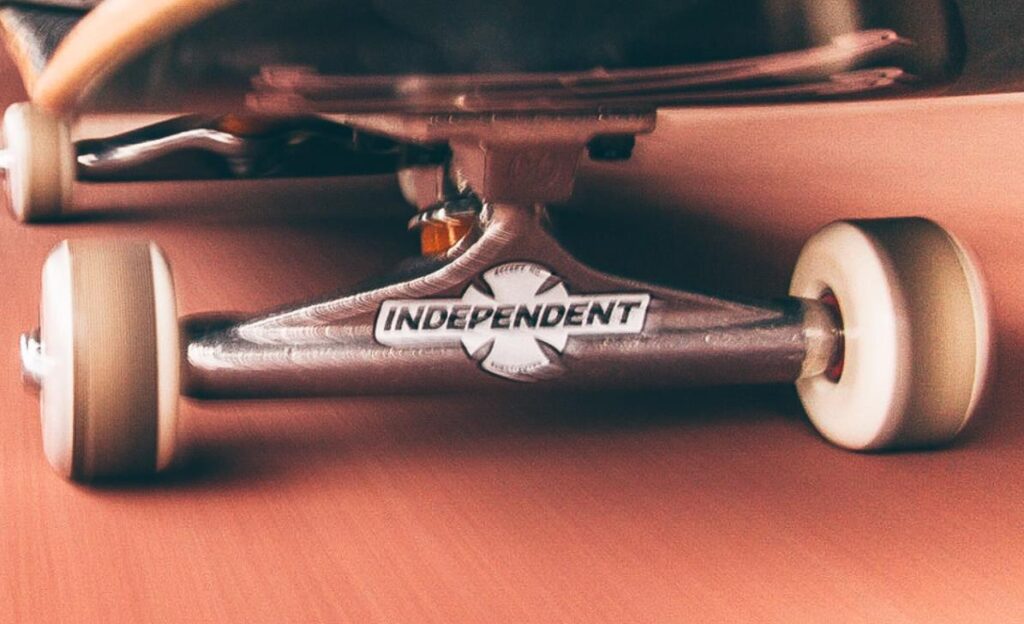
Materials Commonly Used
The primary materials used in skateboard trucks are as follows:
Aluminum Alloys
Aluminum is the most commonly used material for the truck’s main body, known as the hanger. It is lightweight and offers excellent strength-to-weight ratio.

Steel
Steel is often used for the axles and the kingpin. It provides the necessary strength and durability for these critical components.
Urethane
Bushings, the rubbery rings that provide the cushioning for turns, are usually made of urethane. This material offers the right balance of flexibility and resilience.
Other Materials
Some brands use titanium or other exotic materials to offer a unique combination of lightness and strength.
Importance of Material Quality
The quality of the materials used in skateboard trucks can significantly impact the skateboard’s performance. High-quality aluminum alloys and steel components can provide better responsiveness, durability, and overall performance.

Factors Affecting Quality
- Alloy Composition: The specific type of aluminum alloy used can affect the truck’s strength and weight.
- Manufacturing Process: Methods like gravity casting, investment casting, and CNC machining can influence the final quality.
- Finish: The type of finish, such as powder coating or anodizing, can affect the truck’s durability and resistance to environmental factors.
Types of Skateboard Trucks
Different types of skateboard trucks are suited for different skateboarding styles. Here are some common types:
Standard Kingpin Trucks
These are the most common type of skateboard trucks and are typically used for street or park skateboarding.

Reverse Kingpin Trucks
These are generally used for longboarding and offer better stability at high speeds.
Other Specialized Trucks
Some specialized trucks are designed for specific skateboarding styles like slalom, downhill, or freestyle.
How to Choose the Right Material?
Choosing the right material for your skateboard trucks depends on your skateboarding style and what you prioritize more—strength, weight, or flexibility.

Considerations
- Skateboarding Style: Different materials suit different styles. For example, aluminum trucks are generally better for tricks due to their light weight.
- Budget: High-quality materials like titanium will be more expensive.
- Personal Preference: Some skaters prefer the feel of certain materials over others.
Maintenance Tips
Proper maintenance can extend the life of your skateboard trucks, regardless of the material they are made of.
Regular Inspection
Regularly inspect the trucks for any signs of wear and tear, especially the axles and bushings.
Cleaning
Keep the trucks clean to prevent rust and other forms of corrosion.
Replacement
Replace worn-out components like bushings and pivot cups to maintain optimal performance.
Design and Geometry
While the materials used in skateboard trucks are crucial, the design and geometry of the trucks also play a significant role in how they perform.
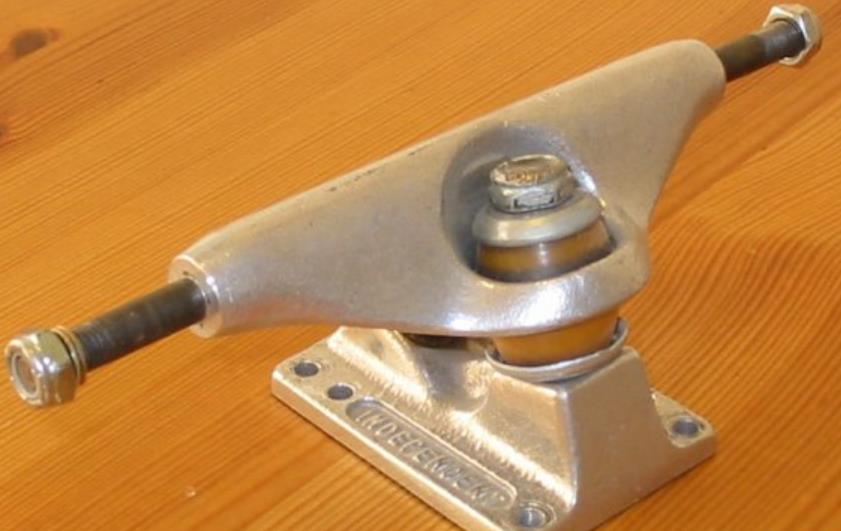
Baseplate Angle
The angle of the baseplate can affect the turning radius and stability of the skateboard. A lower angle offers more stability but less responsiveness, while a higher angle provides the opposite.
Hanger Width
The width of the hanger determines how well the skateboard will perform in different skateboarding styles. Wider hangers are generally better for stability, while narrower ones are better for tricks.
Customization Options
Skateboard trucks can be customized to better suit your skateboarding style and preferences.
Swapping Bushings
Changing the bushings can alter the skateboard’s responsiveness and turning capabilities.
Adjusting the Kingpin
Tightening or loosening the kingpin can also affect the skateboard’s performance, making it either more stable or more responsive.
Eco-Friendly Options
As sustainability becomes more important, some companies are offering eco-friendly skateboard trucks made from recycled materials or sustainable alternatives.
Recycled Aluminum
Some brands offer trucks made from recycled aluminum, reducing the environmental impact.
Sustainable Bushings
Eco-friendly bushings made from renewable materials are also available in the market.
History of Skateboard Trucks
Understanding the history of skateboard trucks can provide valuable insights into their evolution and how they have been optimized over time for better performance.

Early Designs
The first skateboard trucks were rudimentary and lacked the advanced features found in modern trucks.
Technological Advancements
Over the years, advancements in materials science and engineering have led to more sophisticated and high-performing skateboard trucks.
The Future of Skateboard Trucks
The future may bring even more innovations in skateboard truck materials and designs.
High-Tech Materials
With advancements in technology, we may see trucks made from high-tech materials that offer superior performance and durability.
Smart Trucks
The integration of smart technology could offer features like real-time performance tracking and adjustments.
How Skateboard Trucks Are Made?
Skateboard trucks are manufactured using two primary methods: die casting and gravity casting. Both methods require two molds to achieve the desired shape of the truck. The molds are filled with an aluminum metal mix to create a durable, light, and sturdy truck.

Gravity Casting
In gravity casting, metal is poured into the mold, allowing gravity to draw the mixture in. This method is time-consuming but ensures that the trucks produced are strong and robust. It offers advanced solidity and weight distribution compared to die-cast trucks.
Die Casting
Die casting involves using intense pressure to push the metal mix into a mold, speeding up the production process. This method is faster and offers unparalleled consistency from batch to batch.
Components
Skateboard trucks are composed of several parts, including a base plate, kingpin, hanger, kingpin nut, bushings, and washers. Each component plays a crucial role in the overall performance and durability of the truck.
What Are The Differences Between Skateboard Trucks?
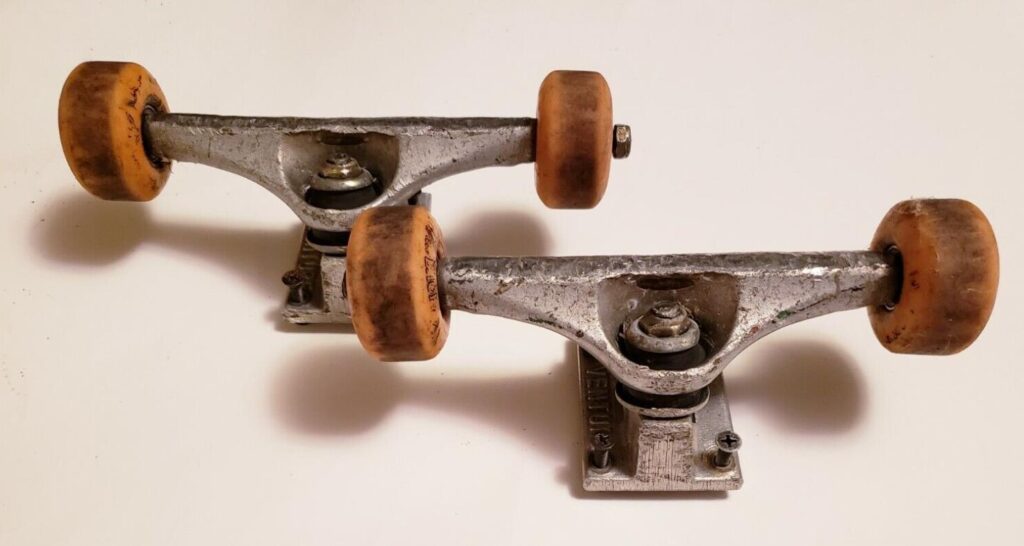
Materials
Skateboard trucks are typically made of aluminum, but other materials like brass, titanium, steel, and nylon can also be used. Aluminum is the best choice due to its lightweight, strong, and lasting properties.
Weight and Durability
The weight and durability of skateboard trucks can vary depending on the material used. For example, steel is heavier and stronger than aluminum but can slow down your skateboard due to its extra weight.
Pro Choices
Many professional skateboarders prefer specific brands and types of trucks. For instance, Hollow Lights II trucks by Thunder Trucks are popular among pros due to their lightweight construction and forged baseplate for added impact resistance.
Can Skateboard Trucks Rust?
Yes, skateboard trucks can rust if they are exposed to moisture for an extended period. The metal parts, particularly the axles and kingpins, are susceptible to rusting.

Rust can affect the performance of your skateboard by making it harder to turn and maneuver. To prevent rust, it’s advisable to store your skateboard in a dry place and wipe it down after use, especially if it has been exposed to water or moisture.
How To Make A Skateboard Truck?
Assembling a skateboard truck involves several steps and requires specific hardware. Here’s a simplified guide:

- Gather Hardware: Each skateboard truck consists of a kingpin assembly and a hanger. You’ll also need washers, bushings, and nuts.
- Place the Hanger: Insert the hanger into one of the large holes in the baseplate.
- Thread the Kingpin: Slide the kingpin through the hole in the hanger.
- Add Washers and Bushings: Slide a washer and bushing onto each end of the kingpin.
- Secure the Kingpin: Use a wrench to tighten the nut onto the kingpin.
- Attach to Board: Line up the truck’s baseplate with the holes in your skateboard and attach using bolts and nuts.
- Repeat: Do the same for the second truck.
Do Skateboard Trucks Need Grease?
Yes, skateboard trucks do benefit from lubrication. Greasing the pivot cups and bushings can make your ride smoother and more responsive.
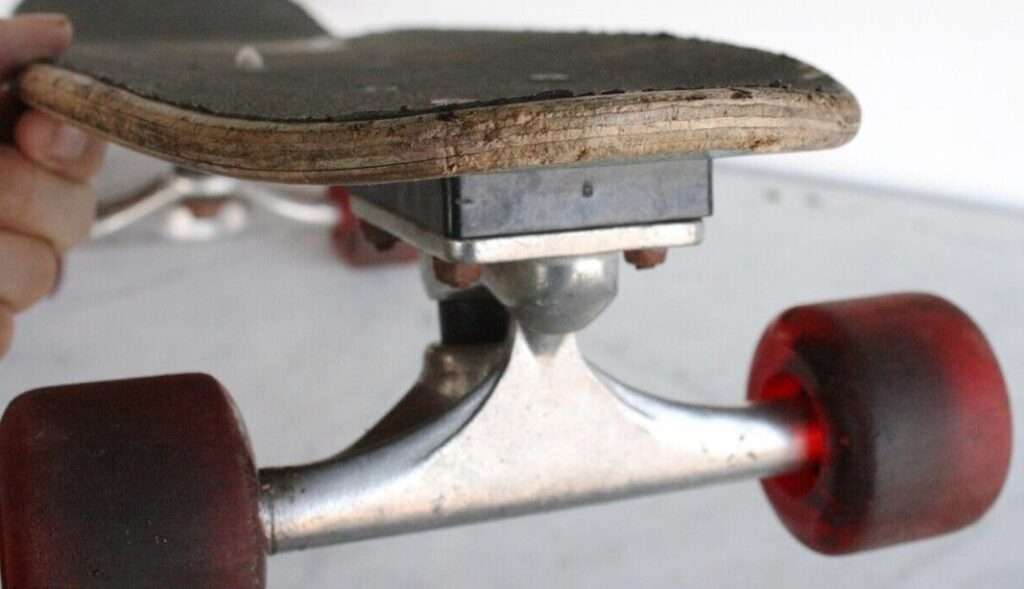
However, it’s essential to use the right type of grease or lubricant designed for skateboards to avoid attracting dirt and debris, which can cause wear and tear.
Conclusion
Understanding what skateboard trucks are made of can significantly impact your skateboarding experience. The materials used, such as aluminum alloys for the hanger and steel for the axles, play a crucial role in the truck’s performance and durability. By choosing the right material and maintaining your trucks properly, you can enjoy a smooth and safe skateboarding experience.
Top FAQ’s
Are all skateboard trucks made of the same material?
No, skateboard trucks can be made from various materials such as aluminum, titanium, and steel. The choice of material affects the truck’s weight, durability, and performance.
Can skateboard trucks be made of plastic?
While some beginner or toy skateboards may have plastic trucks, they are not recommended for serious skateboarding. Plastic trucks are generally less durable and can break easily under stress.
Is it possible to customize the material of my skateboard trucks?
Yes, some brands offer custom skateboard trucks where you can choose the material, but this is generally more expensive than buying pre-made trucks.
How do I know what material my skateboard trucks are made of?
The material is usually specified in the product description when purchasing new skateboard trucks. If you’re unsure, you can also contact the manufacturer for this information.

Welcome to the exhilarating world of Matt Rex, a professional car racer turned renowned vehicle enthusiast. Immerse yourself in his captivating blog as he shares heart-pounding adventures, expert reviews, and valuable insights on cars, trucks, jets, and more. Fuel your passion for speed and discover the beauty of vehicles through Matt’s engaging stories and meticulous expertise. Join the ever-growing community of enthusiasts who find inspiration and expert advice in Matt Rex’s blog—a digital hub where the thrill of speed meets the pursuit of knowledge.



![How Long Does It Take To Remove 5.3 Engine? [Answered]](https://www.turbochaos.com/wp-content/uploads/2023/11/How-Long-Does-It-Take-To-Remove-5.3-Engine-768x519.jpg)
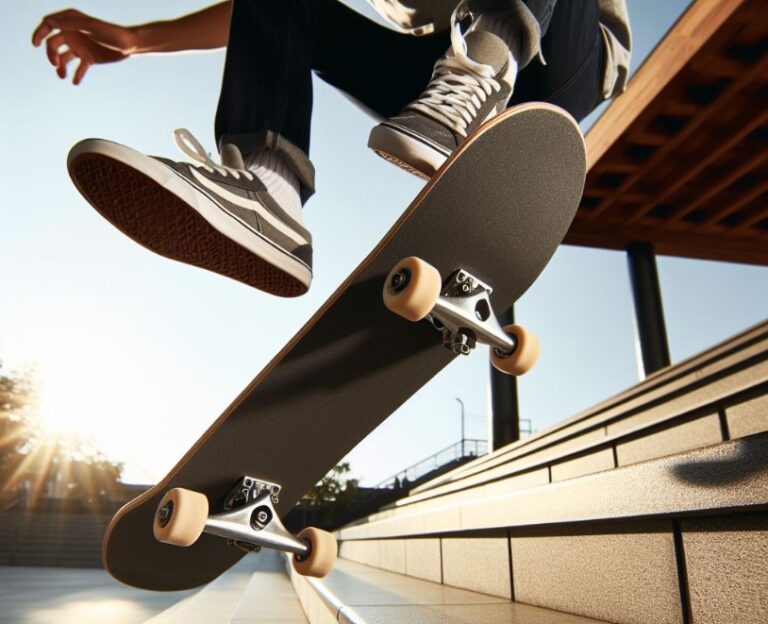
![Polaris Virage Not Getting Fuel [All Causes]](https://www.turbochaos.com/wp-content/uploads/2023/07/Polaris-Virage-Not-Getting-Fuel-768x512.jpg)

